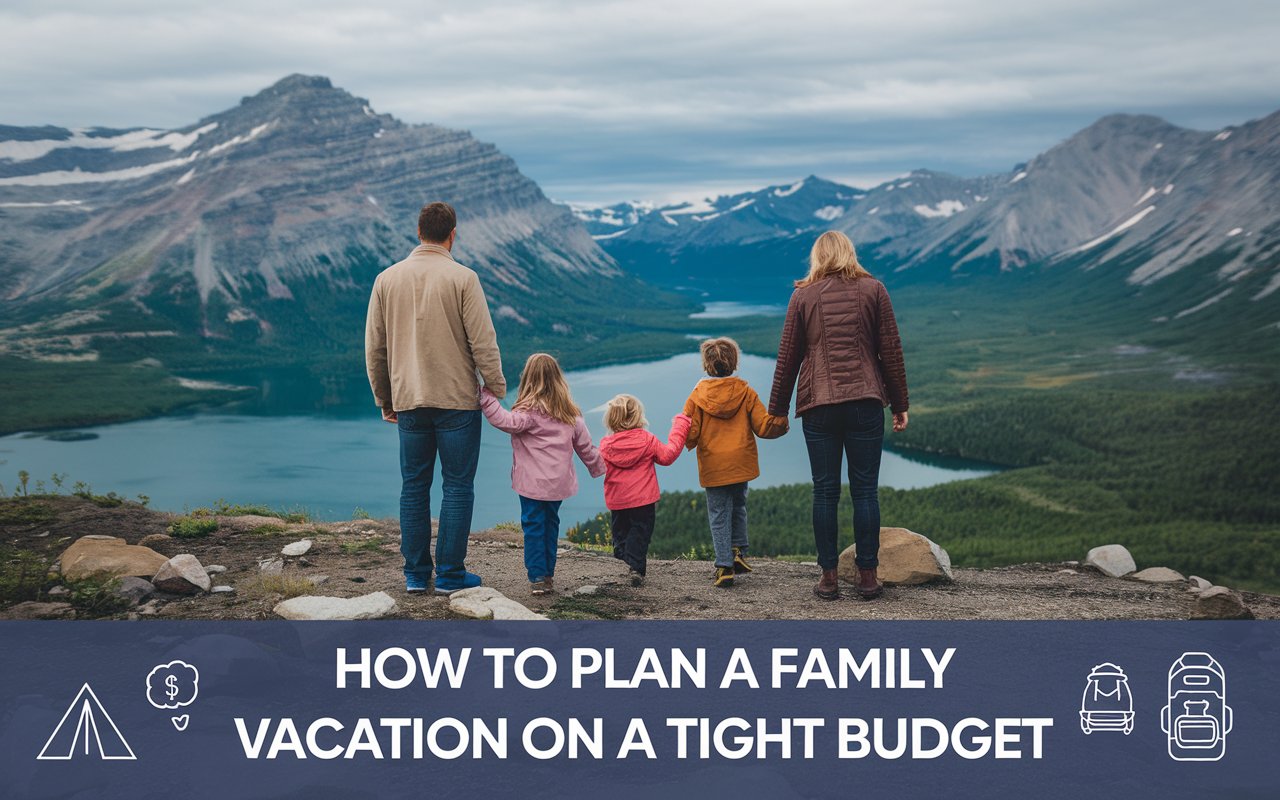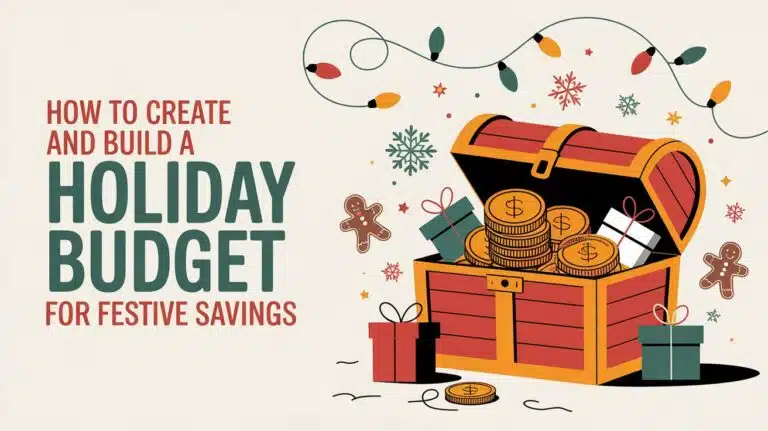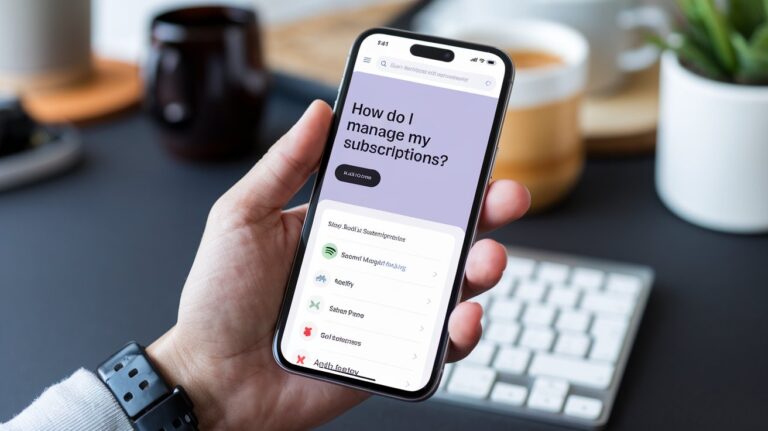Have you ever daydreamed about vacationing with your family without going into debt?
I have! I remember the thrill of taking my kids on our first family road trip.
Packed like sardines in the car, we had a blast, all while keeping an eye on our wallets.
In this post, I’ll share how to have an epic family vacation on a budget—as we all deserve an adventure, right?
Setting the Scene: Budgeting Basics for Family Vacations
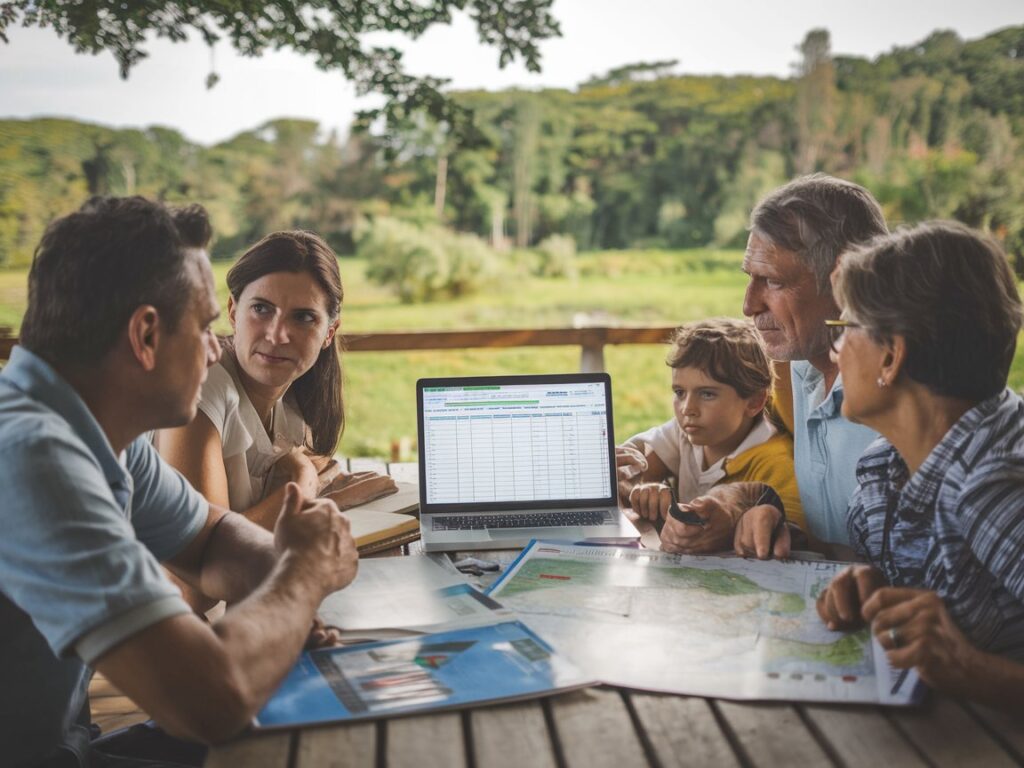
When planning a family vacation, the first step often feels overwhelming.
How do I even start budgeting for such an adventure? The key is to calculate how much you can realistically spend.
I remember when my family went on a trip, and just figuring out our budget was a task in itself. But trust me, it’s essential to lay this groundwork right away.
1. Calculate Your Budget
Before anything else, sit down and review your financial situation. Check your savings, income, and monthly expenses.
Look for any surplus that can be diverted to your vacation fund. You might ask yourself,
“How much can we actually afford without breaking the bank?” This truthful analysis can save you headaches later.
2. Start Saving Early
It’s best to start saving money well before your trip. Aim to build a small vacation fund.
I often start putting aside a few dollars every week. If you save just $20 a week, that’s over $1,000 saved within a year. Doesn’t that sound appealing?
It might also be beneficial to involve the whole family. Establishing a “vacation jar” can be a fun visual reminder of your goal.
3. Consider Monthly Expenses
While setting your vacation budget, consider all your monthly expenses.
Don’t just look at your rent or mortgage; think about bills, groceries, and school fees.
Can you cut back a little on dining out or that daily coffee? Every dollar you save now can go straight into your vacation fund!
4. Track Your Spending
Tracking your spending over time helps with accuracy. I know, it sounds tedious, but it’s incredibly valuable.
By monitoring where your money goes, you’ll spot patterns. Maybe you’re spending too much on takeout each week.
By cutting back on non-essential expenses, you can allocate those funds toward your vacation.
5. Use Budgeting Apps or Spreadsheets
For clarity, use budgeting apps or spreadsheets. These tools simplify the process.
You can easily categorize spending, calculate totals, and get insights into your financial habits.
I found apps like Mint or YNAB (You Need A Budget) extremely user-friendly.
Wanting simplicity in managing your budget shouldn’t scare you away. Why not try it and see how it works for you?
6. Plan in Advance
Planning months in advance is crucial for maximizing your savings. The earlier you start, the more time you have for fun family discussions about your potential trip.
Are you thinking about a beach vacation? Or maybe a mountain retreat?
By discussing these options together, you can build excitement and focus on your goal.
7. Don’t Forget Extra Costs
Include any special costs, like passports or visas, in your budget. I once overlooked this, and it surprised me at the last minute!
These unexpected costs can derail your plans if you don’t factor them in.
Take it from me; it’s better to prepare for these small surprises now than during the trip.
To wrap up, budgeting for a family vacation doesn’t have to be daunting.
By calculating how much you can spend, starting your savings early, and keeping track of expenses, you’ll be well on your way to beach chairs or mountain hikes.
Remember, a little planning can lead to a lot of memories—without the financial stress.
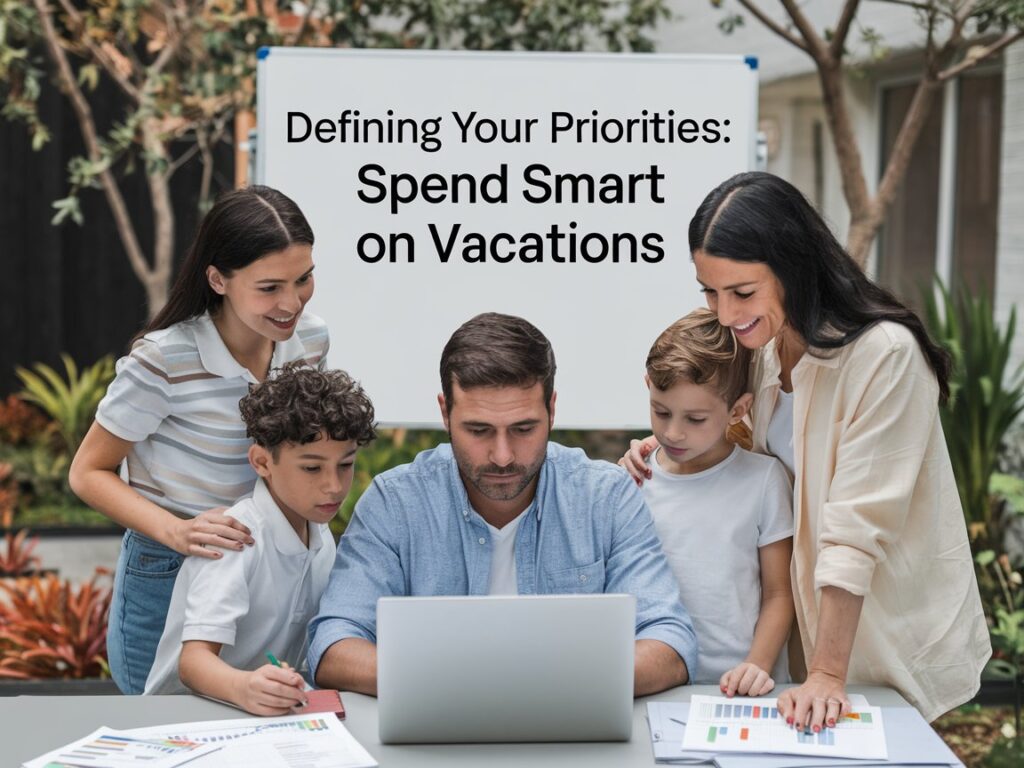
Defining Your Priorities: Spend Smart on Vacations
When planning a vacation, it’s easy to feel overwhelmed. There are so many options. What should we prioritize?
Should we splurge on fancy accommodations, enjoy delicious meals, or indulge in exciting activities?
My experience tells me that defining our priorities can help us spend smart and create lasting memories.
Choose What Matters Most
The first step is to decide what’s most important for your trip. Ask yourself: What will make this vacation enjoyable for everyone?
Is it accommodations, food, or activities? For some families, staying at a nice hotel is crucial. For others, a cozy Airbnb is enough.
- Accommodations: Are comfortable sleeping arrangements a top priority?
- Food: Is trying out local cuisine high on the list?
- Activities: Do you want memorable experiences over luxury?
Reflecting on what your family enjoys most can guide your decisions. I often think back to past vacations.
What did we enjoy? Was it a unique activity that stuck with us? Or was it the local food? Consider these questions seriously.
Reflect on Past Vacations
Take a moment to look back. What experiences made you smile? Was it the beach, hiking in nature, or that charming little café?
Reflecting on these moments helps you understand what to prioritize in the upcoming trip.
In my family, we learned that the most cherished memories often come not from luxury but from simple experiences.
We often enjoyed adventures like hiking or exploring local sights more than expensive dinners.
Take a Vote with Family Members
Once we’ve identified what matters, it’s important to involve everyone. Take a vote. This ensures each family member feels heard.
It can also prevent arguments later on during the trip. Ask questions like:
- Which activities excite you the most?
- What type of food do you want to try?
- Will we prefer a larger hotel or a more personal experience?
Gathering everyone’s input creates excitement and sets expectations. Everyone can contribute to the planning process.
Focus on Experiences Over Expensive Hotels
Here’s a tip: Shift your focus away from luxurious accommodations. Instead, prioritize experiences.
When we travel, we want to create wonderful memories, right? Spending money on great experiences often pays off in the long run.
For example, instead of booking a swanky hotel, consider using those funds for a local cooking class or an adventure day.
We spent less on our stay and had a blast learning a new recipe together. It was priceless!
Allocate Funds Accordingly
After prioritizing, it’s time to allocate your budget. This means deciding where to spend more and where to cut back. For instance:
- If food is a priority, maybe you can skip the fancy accommodation and choose a cozy, budget-friendly place.
- If you want to engage in incredible activities, consider cooking at home to save money.
- Think about family interests and split the budget accordingly.
Remember, you will need to decide which areas you would like to spend a little bit more money on and which areas you prefer to cut back.
Notes to Keep in Mind
As I plan our vacations, I keep the following in mind:
- Prioritize based on family preferences.
- Write down the top three priorities before making any plans.
Focus on what truly matters, and the rest will fall into place. Happy planning!
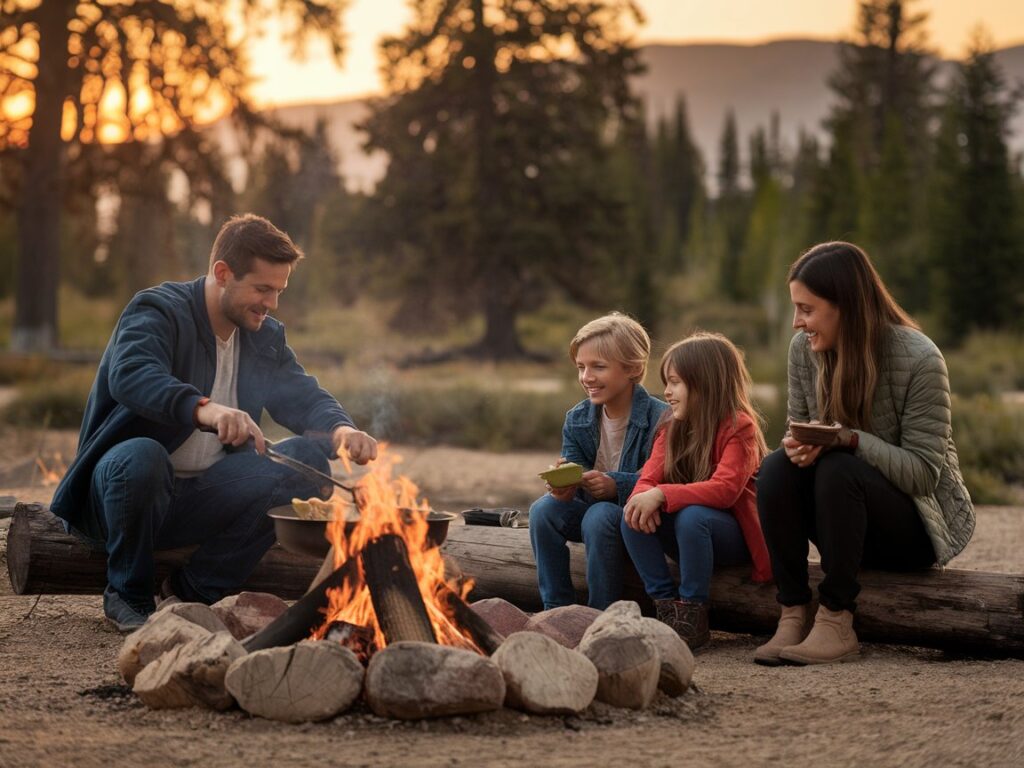
Creative Vacations That Save Money
We all want to create memorable vacations. But what if we could do that without breaking the bank?
Believe me, it’s possible! Here are some creative vacation ideas that can help us save money while enjoying great times together as a family.
1. Visiting Family
One of the easiest ways to cut lodging costs is to visit family. Think about it.
When was the last time you caught up with your relatives? Staying with family not only saves on hotel bills but also on food.
You can enjoy home-cooked meals while sharing priceless moments and stories.
I’ve got a friend who visited family in Hawaii, and it became a cherished memory.
They had the chance to enjoy the beach without the hefty price tag of a hotel.
Plus, they could wash clothes and keep the kids entertained. It’s like a mini vacation that feels grand because you’re with loved ones!
2. Road Trips
Road trips are more than just a way to travel; they’re an adventure!
Isn’t it exciting to think about huddling together in the car, belting out your favorite songs?
Not to mention, road trips offer fantastic bonding opportunities for kids.
- Pack Snacks: It’s super easy to pack snacks. Think peanut butter sandwiches or fruit. It can save you lots of cash you’ll usually spend on meals.
- Flexible Routes: You can take detours to explore quirky roadside attractions. Isn’t it fun to discover hidden gems along the way?
3. Camping Trips
If you love nature, why not embrace it? Camping is an awesome option that saves you money and enriches your family’s experience.
You’ll experience the great outdoors together while learning skills like setting up tents and making fires. It’s like an outdoor classroom!
- Cost-Effective: Campsites are generally much cheaper than hotels. Plus, spending time in nature doesn’t require fancy spending!
- Simple Fun: You don’t need technologies—just the great outdoors. Enjoy stargazing or storytelling by the campfire. It’s a chance to reconnect.
4. Staycations
Don’t overlook your own city! Have you ever thought about being a tourist in your hometown?
A staycation can be just as fun and refreshing as traveling far. Explore local museums, parks, or restaurants you’ve never visited.
We once played tourist in our own city. It was lovely! We discovered a hidden art exhibit and dined at a local café.
We felt like we were in a new place—without the stress of travel!
5. Off-Season Travel
If you’re considering traveling, think about going off-season. It’s a fantastic way to save money and enjoy popular destinations without the crowd.
Imagine visiting a beach in the fall when prices drop, and the scenery is still stunning!
Traveling in the off-season can unlock better deals and a more peaceful experience.
Reflecting on Family Trips
As we think about family trips, none of these ideas require us to go far away.
Sometimes, the best adventures are the ones right at our doorstep. We can unwind and reconnect with nearby attractions.
When was the last time you enjoyed a local event or festival?
By planning creatively and keeping budgets in mind, we can create unforgettable memories.
Think about what matters most to your family. Is it the experience, the laughter, or the food?
Let’s focus on what makes trips special instead of the bill!
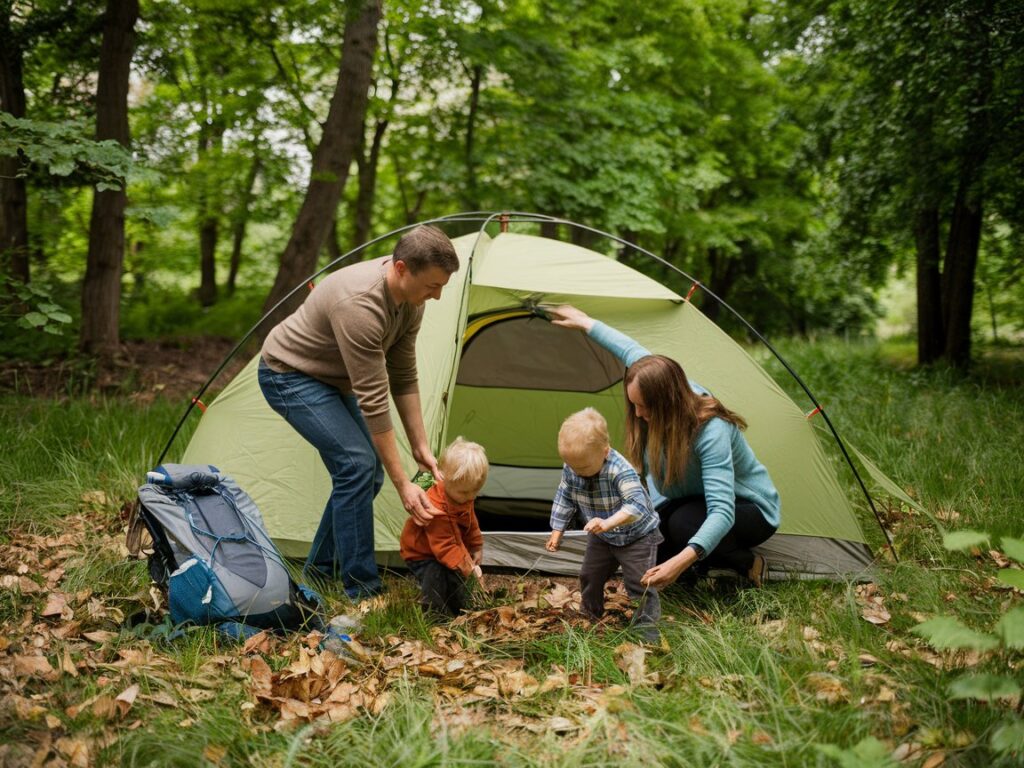
The Great Outdoors: Camping as a Cost-Effective Option
When you think about vacations, the first thing that pops into your mind may not be camping.
But let me tell you, camping can often be cheaper than hotels. I know, it sounds a bit strange, right? But hear me out.
Why Camping is Cheaper Than Hotels
Hotels can add up quickly. You pay for the room, the amenities, and sometimes even high resort fees!
In contrast, a campsite might just charge you a small fee for a plot of land.
It’s like having your own backyard adventure—just without the risks of a neighbor playing loud music.
- Less Costly Accommodations: Campsites generally have much lower fees compared to hotels.
- Self-Catering Options: You can cook your own meals, which saves money. Remember those oversized hotel meal prices? Yeah, no thanks!
So, if you pack your tent and get excited to snooze under the stars, you can enjoy the great outdoors without breaking the bank.
Find Local Campsites for Easy Access
Finding a local campsite is easier than you might think. Many parks and recreation areas have camping spots just waiting for you.
Use smartphone apps or websites to locate nearby campsites.
It saves travel time and cost!
Camping is a great option if you don’t have friends or family in the location that you want to visit.
This is especially true for first-time campers. It allows you to dip your toes into outdoor living without a long drive.
Plus, it can be a delightful escape from your daily routine.
Create a Camping Meal Plan for Budget-Saving
Food can be one of the biggest expenses on any trip. Planning a meal list can help keep your pocketbook intact.
- Breakfast: Think cereal, oatmeal, or breakfast burritos. These are easy to pack, quick to prepare, and energy-packed!
- Lunch: Go for sandwiches and wraps. They’re portable and satisfying.
- Dinner: Consider grilling burgers or making foil pack dinners. Just throw your veggies and protein in some foil and cook over the campfire.
Having a clear meal plan will not only save you money but also cut down on stress about what to eat when you’re out in the wild.
Share Tips for Packing Camping Essentials
Packing is an art. You want to bring what you need, without overloading the car. Here are some essentials that should be on your packing list:
- Quality Tent: A good tent will keep you dry and comfy.
- Sleeping Bag: Choose one suited for the temperatures you’ll be camping in.
- Cooking Supplies: Don’t forget a portable stove, utensils, and a cooler for food.
- First Aid Kit: Safety first! You never know when you might need it.
Remember, you can always make room for those extra s’mores ingredients!
Limit Screen Time to Bond Better With Family
And let’s dive into an essential aspect of camping: the quality of time spent with family.
In our digitally dominated world, we often forget to connect face-to-face.
When camping, make it a goal to limit screen time. Nature offers countless activities.
Play cards, tell stories, or explore the surroundings. Wouldn’t you prefer a fun game of charades over yet another episode of your favorite show?
By shutting down devices, you open the door to better family bonds and unforgettable memories under the stars.
So, whether you’re camping to save money or to spend more quality time together, it’s an adventure worth having.
The ease of planning and budget savings can make camping a top contender for your next getaway!
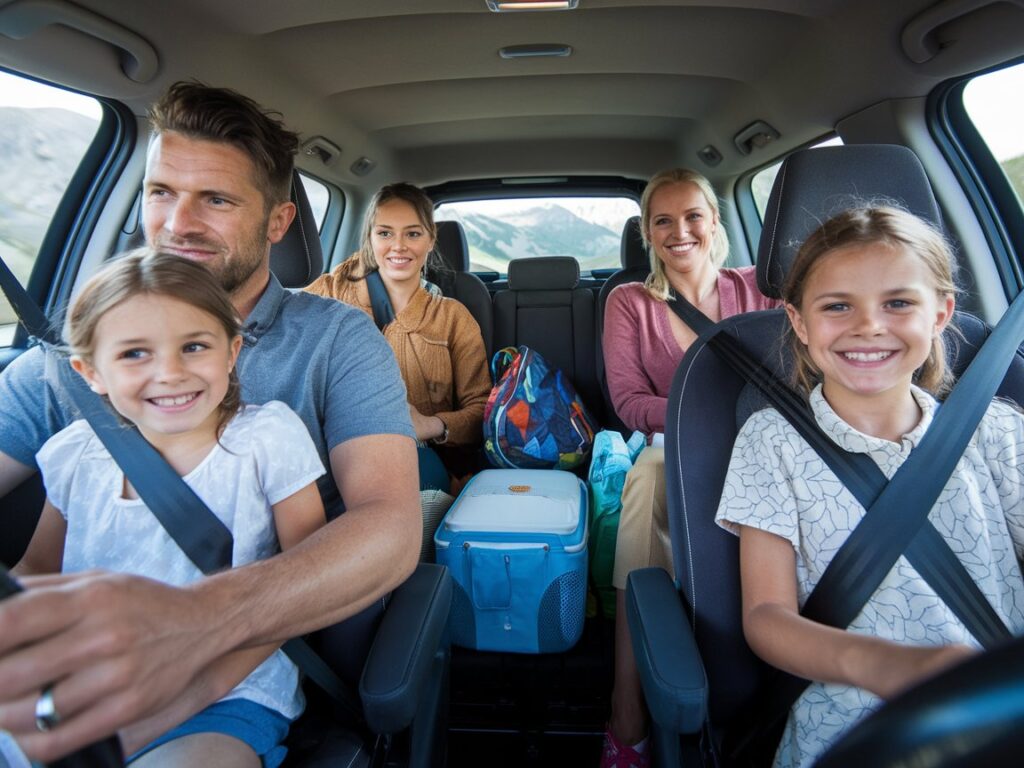
Making Travel More Affordable: Road Trips and Card Benefits
Let me take you back to our first family road trip. It was an adventure full of laughter, excitement, and a bit of chaos.
We packed the car to the brim, the kids were bubbling with energy, and we hit the road.
Sounds fun, right? But with a little planning, we could make it even better.
Use Credit Card Points for Flights—Plan Early
One tip I can’t stress enough is planning ahead. Using credit card points is like finding money in your jacket pocket.
When we traveled a few months back, I realized that booking flights early with our points saved us a bundle.
Now, don’t scramble last minute. Start checking your credit card offers early.
Some cards come with great travel perks. The earlier you plan, the better options you’ll have.
Design a Strategic Packing List for Road Trips
Also, let’s talk about packing. If you’re anything like us, packing can get out of hand.
We had toys, snacks, and even the kitchen sink! To avoid chaos, I created a strategic packing list.
- Essentials: Clothes, toiletries, and medication.
- Entertainment: Books, games, and tablets.
- Snacks: Healthy and easy-to-eat options.
Having everything organized saved us time and kept our spirits high on the journey. Less searching means more fun!
Consider Taking Scenic Stops Along the Way
Oh, and don’t forget those scenic stops. They can turn a long drive into an adventure!
Imagine pulling over at a beautiful vista or a quirky roadside attraction.
Just think about it: a quick stretch, a snack, and a snapshot of a stunning view.
Every moment becomes a memory. It breaks the monotony and keeps the kids excited. Doesn’t that sound perfect?
TRACK Costs: Tolls, Gas, Snacks as You Go
Tracking costs is another game changer. You might think tracking expenses is dull. But it’s crucial.
Every mile, every snack, and every toll adds up. Start by keeping your receipts or use an app.
I promise, it’s easier than it sounds. When you plan well, you can adjust spending to stay within budget. Plus, isn’t it nice to know where your money goes?
If you have considered doing a road trip and have been nervous… give it a try
Engagement is Key for Road Trip Success
Speaking of planning, let’s not overlook the importance of engagement.
When everyone pitches in, it makes the trip special.
The kids can help pick the music or even suggest fun stops. It shapes the journey and creates an inclusive atmosphere.
I found that simple games worked wonders. From road trip bingo to ‘I spy,’ these little interactions transformed our car into a hub of laughter.
Ultimately, finding joy in journeying together is what it’s all about. We experience so much together.
Every laugh, every setback, becomes a cherished memory. And trust me, that feeling is priceless.
So, the next time you think about flying somewhere, remember: going on a road trip can save you a lot of money compared with flying.
Plus, where will your next adventure take you? A road trip, like ours, might just be waiting for you! Let’s pack up and hit the road!

Preparing Steps: Making the Most of Your Travel Planning
Now that you’ve finished brainstorming for your vacation, it’s time to dive into the preparation part.
Planning a trip can sometimes feel overwhelming, but trust me; a little organization goes a long way.
By focusing on key aspects of your travel, you can enjoy a memorable adventure without breaking the bank.
1. Save Money as Early as Possible
The first step is to save money early. Why? Because extra cash is always a win! Take time to review your monthly budget.
Are there areas where you can cut back? Perhaps eating out less or skipping that extra coffee run.
Every little bit adds up. Start saving months in advance. This way, you can accumulate a nice little sum to spend on experiences.
2. Confirm Arrangements Ahead of Time
Next, be sure to confirm your arrangements ahead of time. This includes where you’ll stay and how you’ll get there.
Imagine arriving at your destination only to find your hotel overbooked! It’s a nightmare for any traveler.
I’ve learned the hard way that it pays to double-check. Call ahead to confirm your lodging. A little verification can save you from stress later.
3. Plan Meals Meticulously
Food is often a significant part of any trip’s budget. That’s why it’s crucial to plan meals meticulously. Create a meal plan for your travel days.
Try to stick to a mix of cooking and dining out. Consider packing snacks for the road or quick breakfast options.
It not only saves money but keeps you energized for adventures. Have you ever tried peanut butter and jelly sandwiches on a picnic? It’s a classic!
4. Research Free Activities
Don’t overlook the value of free activities at your destination. Many cities offer free tours, parks, or museums.
Research beforehand. Make a list of places you can visit without spending a dime. I remember exploring a beautiful park during a trip.
It was free, and we ended up having an incredible time. You can connect with nature or immerse yourself in local culture without spending a dollar.
5. Create a Detailed Itinerary
Finally, don’t forget to create a detailed itinerary. This is crucial for budgeting purposes.
Keep track of your planned expenses for meals, activities, and lodging. It helps you see where you stand financially during your trip.
Plus, it ensures you don’t miss out on anything you want to do. Planning is just a part of the adventure!
Additional Notes
As I prepare for travel, I remind myself to organize essential details early on. Start small, and it won’t feel overwhelming.
You’d be surprised at the rewards good planning can bring—less stress and more savings.
Keeping track of your expenses while you travel makes it easier to stay within that budget you worked so hard to create.
Consider sharing your own planning tips or experiences in the comments.
After all, everyone’s travel journey is unique. The insights we gather can enhance future adventures for all!
Table of Key Preparation Steps
| Preparation Step | Description |
| Save Money Early | Start cutting costs in your monthly budget well in advance. |
| Confirm Arrangements | Ensure lodging and travel connections are secured ahead of time. |
| Plan Meals | Prepare a meal plan with options for cooking and dining out. |
| Research Free Activities | Look for local free attractions and events available at your destination. |
| Create an Itinerary | Document all planned expenses and activities for better budgeting. |

Enjoying Your Vacation Without Financial Worry
As we wrap up our discussion on budget-friendly vacations, let’s focus on how to keep the joy alive without worrying about overspending.
After all, vacations are about creating lasting memories with loved ones, and we don’t want financial stress to overshadow that.
It’s important to carry forward the lessons learned from each trip. It’s not just about saving money; it’s about enhancing our experiences. So where do we begin?
Monitor Your Spending
First things first: keep monitoring your vacation spending regularly. Yes, it can be easy to lose track of how much you’ve spent when you’re having fun.
But just like a bank account, your budget needs checking. I find it useful to jot down expenses as they happen.
It’s like a little game—can I stay under budget while still enjoying my trip?
This little trick ensures that when I return home, I’m not met with sticker shock at the credit card bill.
Reflect After Your Trip
Once you’re back, take some time to reflect with your family. What worked well? What didn’t go as planned?
Did we splurge where we should’ve saved? These reflections can help make our next family vacation even better.
When we share our experiences, we learn as a unit. That can enrich our family dynamics.
Consider Journaling Your Experience
Another insightful approach is to consider journaling your vacation experience.
Write down what you loved, the moments that made you laugh, or even the hiccups along the way.
Trust me, it’s fun to look back and read about those silly things that’d make you chuckle years later. They become part of your family lore!
Revisit Your Budget
When the next trip starts to come into focus, let’s revisit budgeting for your next adventure. What did we learn this time?
Did we find ways to save, perhaps eating at local diners instead of expensive restaurants?
Adjust your budget based on your previous trips to improve. After all, each journey is a building block for the next one.
Turn Memories into Discussion Points
Finally, let’s turn memories into fun discussion points for future trips. Share laughter over the great moments and lessons learned from mishaps.
For example, maybe that time we got lost in a new city led us to discover a hidden gem.
Those stories not only solidify our bond but also inspire future adventures.
When we sit around the dinner table and reminisce, it’s like adding extra spices to our relationships!
I hope this article helped you plan your family vacation on a budget
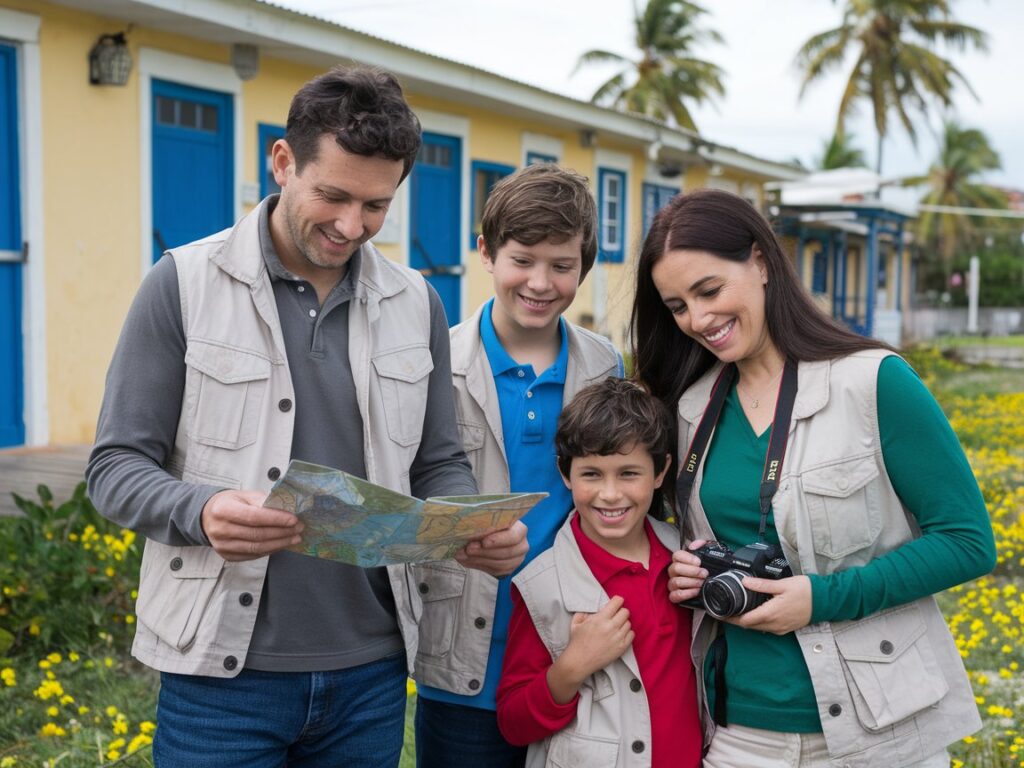
FAQs About Budget-Friendly Family Vacations
Key Takeaways
- Set a Realistic Budget: Assess your finances to determine how much you can spend on vacation.
- Save Early: Start a vacation fund with small, regular contributions to build savings.
- Prioritize Experiences: Focus your budget on what matters most—activities, food, or accommodations.
- Consider Cost-Effective Ideas: Explore options like visiting family, road trips, camping, or staycations to save money.
- Plan Ahead: Book in advance and consider off-season travel for better deals and fewer crowds.
In closing, it’s crucial to remember that budgeting doesn’t mean sacrificing joy. It means thoughtfully planning our experiences.
We can track our spending, reflect on our adventures, and continuously improve our approach.
Keeping track of how much money we’re spending helps us avoid disappointment when we return home.
If we’re engaged and mindful, every vacation can lead to cherished memories.
So, here we go—here’s to our next adventure, planned with care and filled with fun!
TL;DR: With careful planning and smart choices, you can create cherished family memories without overspending. Discover the best budget-friendly vacation ideas and tips to stick to your budget.
